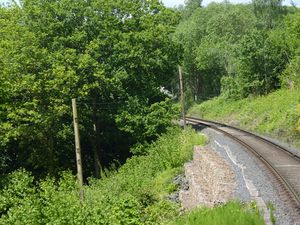Difference between revisions of "Folly Point"
m (Add link) |
m (add links) |
||
| Line 2: | Line 2: | ||
Folly Point is situated between Bewdley and Arley, or more specifically between [[Northwood Halt]] and Trimpley Reservoir north of milepost 139½. It is the narrowest part of the valley along the line, with the River Severn running close to the line and around 40 feet below it. This has made the area prone to landslips both in history and preservation. | Folly Point is situated between Bewdley and Arley, or more specifically between [[Northwood Halt]] and Trimpley Reservoir north of milepost 139½. It is the narrowest part of the valley along the line, with the River Severn running close to the line and around 40 feet below it. This has made the area prone to landslips both in history and preservation. | ||
| − | A major slip in [[Severn Valley Railway Timeline 1980-1989#1980 | 1980]] required excavation of the formation, the insertion of stone filled ‘gabions’ and the lifting of the track by around 18 inches over a length of some 60 feet. | + | A major slip in [[Severn Valley Railway Timeline 1980-1989#1980 | 1980]] required excavation of the formation, the insertion of stone filled ‘gabions’ and the lifting of the track by around 18 inches over a length of some 60 feet.<ref name=JM>[[Bibliography#Books|Marshall (1989)]] p. 95.</ref> |
Folly Point was also affected by the freak storms of June 2007. A description of the damage and photographs of the repair work in progress are included [[2007 Storm Damage | here]]. | Folly Point was also affected by the freak storms of June 2007. A description of the damage and photographs of the repair work in progress are included [[2007 Storm Damage | here]]. | ||
| − | Immediately south of Folly Point, | + | Immediately south of Folly Point, the [[Elan Valley Aqueduct]] carries water from the Elan Valley across the River Severn. During construction of the aqueduct in 1899, a siding known as '[[Folly Point Siding]]' was constructed for the contractor’s use, but removed in 1906 when the aqueduct was completed.<ref name=JM/> The pipes from the aqueduct that pass underneath the SVR metals were replaced in the winter of [[Severn Valley Railway Timeline 2010-2019#1015 | 2014-15]]. |
==See also== | ==See also== | ||
| − | [[From The Window]] | + | *[[From The Window]] |
| − | [[2007 Storm Damage]] | + | *[[2007 Storm Damage]] |
==References== | ==References== | ||
| − | + | <references/> | |
| − | |||
| − | |||
Revision as of 15:53, 24 November 2018
Folly Point is situated between Bewdley and Arley, or more specifically between Northwood Halt and Trimpley Reservoir north of milepost 139½. It is the narrowest part of the valley along the line, with the River Severn running close to the line and around 40 feet below it. This has made the area prone to landslips both in history and preservation.
A major slip in 1980 required excavation of the formation, the insertion of stone filled ‘gabions’ and the lifting of the track by around 18 inches over a length of some 60 feet.[1] Folly Point was also affected by the freak storms of June 2007. A description of the damage and photographs of the repair work in progress are included here.
Immediately south of Folly Point, the Elan Valley Aqueduct carries water from the Elan Valley across the River Severn. During construction of the aqueduct in 1899, a siding known as 'Folly Point Siding' was constructed for the contractor’s use, but removed in 1906 when the aqueduct was completed.[1] The pipes from the aqueduct that pass underneath the SVRSevern Valley Railway metals were replaced in the winter of 2014-15.
See also
References
- ↑ 1.0 1.1 Marshall (1989) p. 95.
